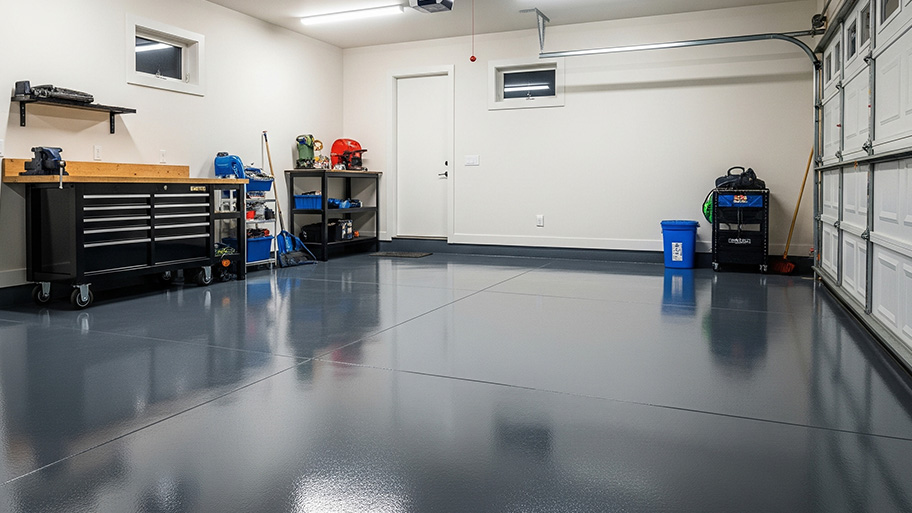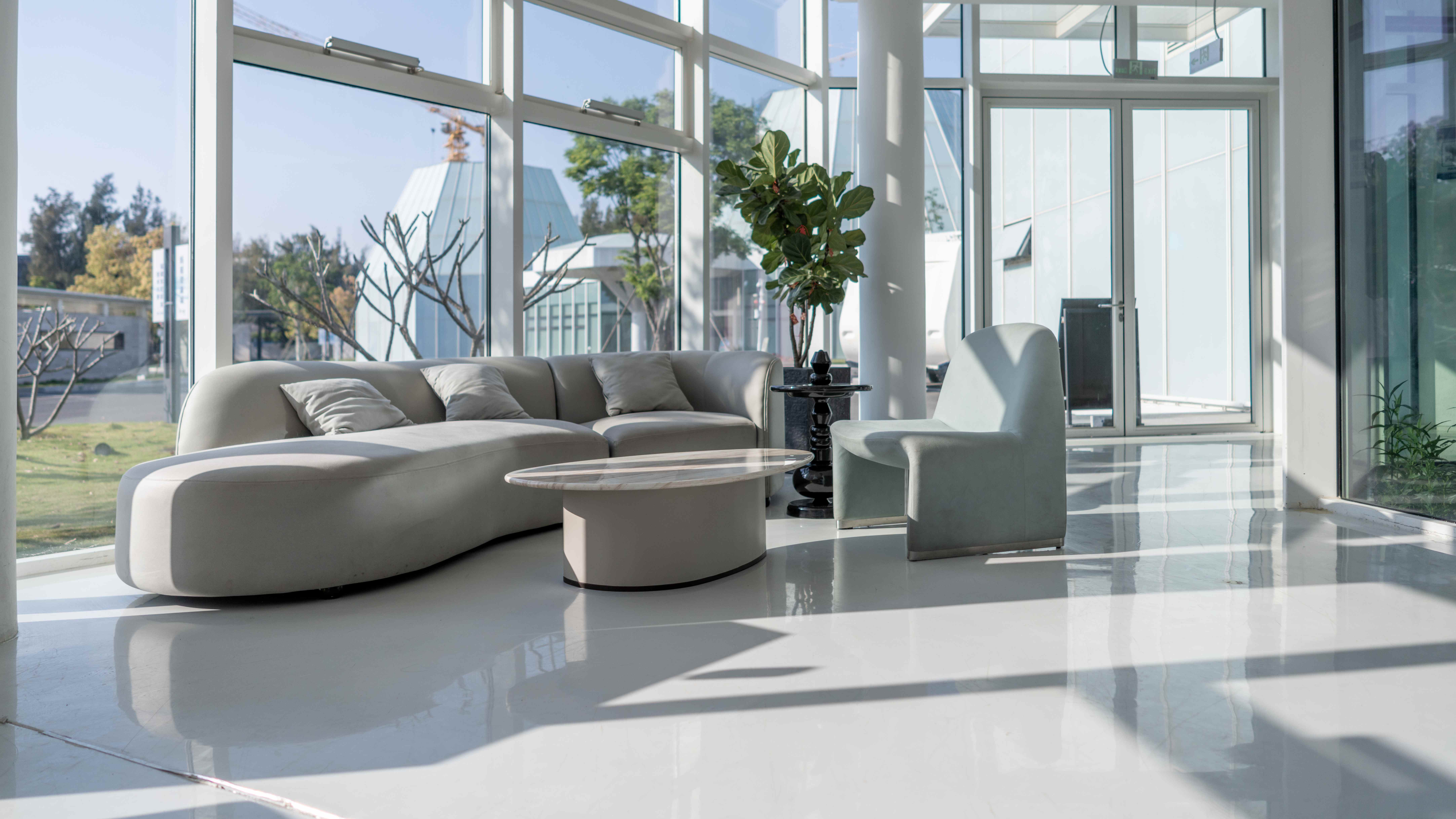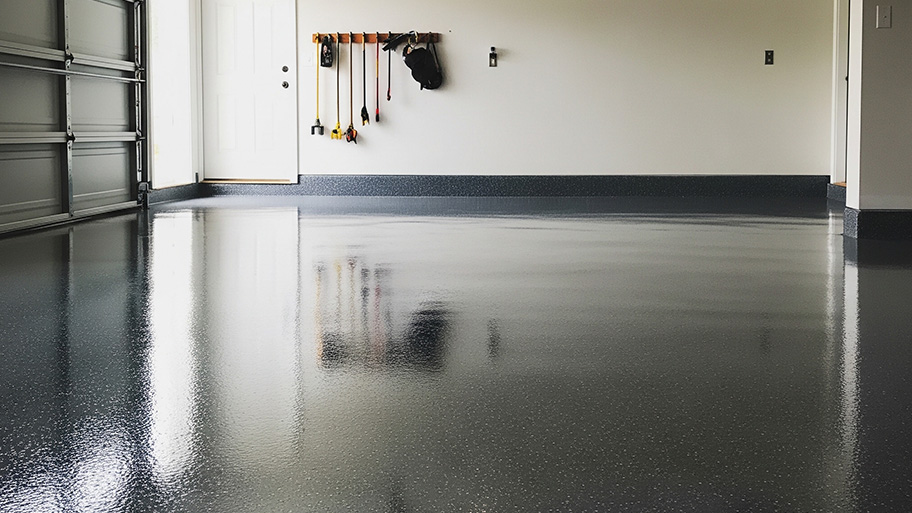
This guide breaks down the cost of installing epoxy flooring in your garage, basement, or other space. Costs depend on resin type, floor size, and more.
The average cost of concrete sealing is $1,500 for a 1,000-square-foot area, and most pay from $1,350 to $3,500.


Expect to pay $1.50 per square foot for concrete sealing, with most projects costing $1,350 to $3,500 overall.
A gallon of sealer covers up to 300 square feet, and acrylic sealer has the lowest cost at $16 to $75 per gallon.
Concrete contractors charge between $1.25 and $1.75 per square foot for labor, depending on sealer type, location, and the size of the area.
A small, 100-square-foot slab might cost between $135 and $200 to seal, with materials and labor included.
If your concrete requires resurfacing prior to sealing, expect an additional cost of $60 per square foot. Removing old sealant costs an additional $1 to $3 per square foot.
It costs $1,500 on average to seal a 1,000-square-foot-area of concrete, or about $1.50 per square foot. Depending on location, material, and size, most homeowners spend between $1,350 and $3,500 on a concrete sealing project.
Concrete is one of the most durable materials on your property. Regardless of whether it’s in the basement or the driveway, adding a layer of sealer to your concrete can help preserve its look and also make it more resistant to the elements.
The cost of sealing concrete ranges from $0.10 to $0.75 per square foot for materials alone. With the cost of labor added, it’s $1.35 to $2.50 per square foot on average.
The final price depends on the type of material, dimensions, and location that needs sealing, plus the labor. Take note that if you have a small area that needs sealing, a professional concrete sealer may charge you a flat fee regardless of the square footage of the job.
| Size (Square Feet) | Average Cost with Labor |
|---|---|
| 50 | $65–$150 |
| 100 | $135–$250 |
| 250 | $335–$650 |
| 500 | $625–$1,250 |
| 1,000 | $1,350–$2,500 |
“When sealing concrete that is at least a year old, the cost of cleaning and properly preparing the surface must also be considered,” says Expert Review Board member Matt DiBara of DiBara Masonry. “This process can include work such as removing all adjacent furniture, power washing the area, a light acid wash and neutralizing, and installing tape and plastic to protect windows and doors.”
Although this process varies based on how much cleaning and preparation is needed, DiBara says it often costs between $1 and $1.75 per square foot for older concrete areas that can benefit from the look and feel of a fresh coat of sealer.
Other than the size of the area you’re sealing, there are a few important factors to consider that impact the cost of sealing concrete. Keep in mind that concrete repairs that need to be done before sealing the surface will increase the project's total price.
There are different types of concrete sealers, and some tend to be more affordable than others, since some are water-based while others are oil-based. For instance, acrylic sealers are often less expensive than epoxy-based sealers. On average, expect to pay around $20 to $60 per gallon.
When choosing your concrete sealing, most sealer options are versatile and can work indoors and outdoors, both vertically and on flat surfaces. One gallon of sealer covers roughly 150 to 300 square feet.
| Sealer Type | Average Cost per Gallon | Best For |
|---|---|---|
| Acrylic | $16–$75 | Affordability and use both indoors and outdoors |
| Epoxy | $40–$175 | High-quality indoor sealing |
| Polyurethane | $25–$110 | Areas where the temperature fluctuates |
If you decide to hire a local driveway contractor, expect to pay around $1.25 to $1.75 per square foot, plus any additional repairs needed. The cost may increase based on the type of sealer you choose, the physical location, and the dimensions of your driveway, basement, or concrete floor––wherever it is that you are sealing. If the area is small, expect the cost per square foot to be higher if your contractor charges a minimum fee.
The location of your concrete floor has a large impact on the type of sealant and number of coats you'll need. Indoor sealers will differ from surfaces up against outdoor elements. The prep and potential damages will also depend on the concrete's purpose.
Garages, for example, need an epoxy sealer to provide a waterproof finish, which costs $40 to $175 per gallon, depending on what garage floor coating contractors near you charge.
Here’s a breakdown of what kind of sealer is best for the location of your concrete and how much it costs.
| Location | Type of Sealer | Average Cost per Gallon |
|---|---|---|
| Basement | Epoxy | $40–$175 |
| Garage | Epoxy | $40–$175 |
| Driveway | Acrylic | $16–$75 |
| Walkways, sidewalks, and steps | Polyurethane | $25–$110 |
| Patio | Polyurethane | $25–$110 |
| Countertops | Epoxy or polyurethane | $25–$175 |
| Floors | Epoxy | $40–$175 |
While small DIY fixes, such as normal concrete cracks, will only cost the price of the tube of filler to fix, concrete resurfacing costs an average of $60 per square foot. Once your concrete is in tip-top shape, be sure you know how to clean concrete before adding the sealer.
Before you freshly seal concrete, you must remove any existing sealant. The cost to remove existing sealant depends on the type of sealant that was previously used. On average, it costs between $1 and $3 per square foot to remove sealant.
The number of coats necessary will depend on the type of concrete finish, where the concrete is located, and its daily use. Anything beyond the standard two coats of sealer will add to the base price for both materials and labor.
Concrete sealers cost between $0.10 and $0.75 per square foot. But while sealing the concrete yourself is the most affordable option, it’s quite a time-consuming process that involves much prep work. Here are some of the materials you need to DIY seal concrete:
| Materials Needed for DIY Concrete Sealing | Average Cost |
|---|---|
| Concrete Sealer | $100 |
| Long-Handled Brush | $15 |
| Paintbrush | $5 |
| Paint Roller | $30 |
| Paint Sprayer | $50 |
| Pressure Washer | $130 |
| Squeegee | $10 |
| Trowel | $15 |
If you don’t want to go through the hassle of the concrete sealing process or want to minimize mistakes, such as picking the wrong sealant or not letting it dry thoroughly, contact a local concrete company. This is especially important if you live in a humid area or one that gets frequent rain because the moisture level can result in concrete that isn’t correctly sealed.
If you decide to hire a concrete contractor to take care of it for you, the cost to seal concrete will be between $1.25 and $1.75 per square foot.
Note: Volatile organic compounds (VOCs) can be dangerous as they are highly flammable and can lead to short- and long-term adverse health effects, according to the U.S. Environmental Protection Agency. It’s important to wear a respirator approved for working with sealers containing high levels of VOCs. Apply these sealers in a well-ventilated area and away from heat sources and open flames.
You should seal concrete every one to five years depending on the external conditions and level of wear and tear. A masonry contractor can advise on how often your surface will need resealing.
Sealing concrete protects it and adds a pristine aesthetic. However, a few other common add-ons can improve the look of sealed concrete.
Stain: Staining concrete can add a pop of color and gloss to concrete floors. On average, stained concrete floors cost between $2 and $6 per square foot.
Polish: Adding polish to finish concrete floors gives the concrete a high gloss look. On average, polished concrete floors cost between $3 and $8 per square foot.
Stencils: Stenciling concrete floors can help you add unique patterns and colors to your concrete floor. You can get both stock and custom-designed stencils, and depending on the intricacy, stenciling concrete floors costs between $9 and $20 per square foot.

One of the best parts of sealing your concrete is that the process itself will lower the costs of cracks and other repairs over time. Lower the price of concrete sealing itself by doing the following:
DIY the Prep Work: Clear out the area, remove stains, and address DIY-able concrete repairs yourself before hiring a pro.
Choose the Right Sealer: Different sealers are made for different types of surfaces and uses. Looking for one that suits your specific surface helps you avoid having to re-apply sealer for a while.
Allow Proper Drying Time: Follow the manufacturer’s guidelines for drying time between coats to get the most durable finish.
Buy in Bulk: Seal several areas of concrete at the same time to buy the materials in bulk and lower overhead costs.
Use the Right Tools: Investing in or renting high-quality tools, like a good sprayer, can make the application process more efficient and reduce waste.
From average costs to expert advice, get all the answers you need to get your job done.

This guide breaks down the cost of installing epoxy flooring in your garage, basement, or other space. Costs depend on resin type, floor size, and more.

Garage floor replacement costs $2,200 on average but can vary depending on several factors. Review our guide for a more accurate estimate.

Sealing your concrete helps it last longer—and look better. Learn how to seal concrete yourself to save money and keep it looking and performing like new.

Will your space thrive with epoxy floors? Make sure the room's purpose and your budget align with the pros and cons of epoxy flooring.

Looking for a way to update your concrete garage floor on a budget? From epoxy paint coatings to rubber and carpet tiles, explore the pros and cons of the top affordable garage flooring ideas, and compare prices using our helpful guide.

Whether you’re installing an epoxy floor or epoxy countertop, this calculator will help you determine how much epoxy you need to complete your project.